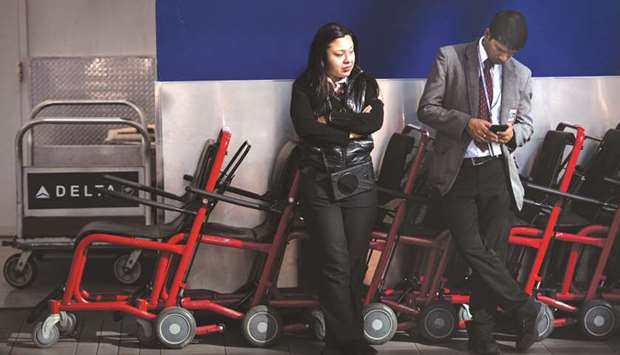Passenger requests for wheelchair assistance received by airlines have been increasing globally in the recent years.
Many assistance requests come from passengers who need support, such as elderly passengers and persons with disabilities and reduced mobility who do not feel confident navigating their way through busy airports on their own.
At times, certain passengers might need extra help to get to and from their flights. For those recovering from surgery or have a health condition that make walking difficult, airport wheelchair assistance come in handy.
Rising income levels across the world, particularly in emerging countries, enable more people of different age groups to fly. They include persons with disabilities and reduced mobility.
The increase in assistance requests is significant, the International Air Transport Association stated in a report recently. The total number of wheelchair requests in 2017 was approximately 15mn, a 30% increase on 2016, it noted.
More than 1bn people live with disabilities around the world, representing 15% of the global population, data show.
While this signifies a huge potential market for travel and tourism, it still remains vastly under-served due to inaccessible facilities and services, as well as discriminatory policies and practices, according to the United Nations.
For persons with disabilities and reduced mobility, travelling by air can often be a challenge, as finding information on accessible services, checking luggage on a plane, booking a room to fulfil access needs, often prove to be difficult, costly and time consuming.
A recent IATA survey revealed that requests for wheelchair assistance are more prevalent in certain geographies, particularly on flights to and from India, the US, GCC and Europe. Providing better access and improving travel experience of passengers with disabilities is gaining greater regulatory importance globally, according to the International Air Transport Association. IATA Resolution 700 related to assisting passengers with disabilities first came into effect in 1952, making the global trade body of airlines one of the first industries addressing the needs of such persons.
Thanks to the Air Carrier Access Act of 1986, all US-based airlines must offer passengers with disabilities wheelchair transportation to and from their gates. Foreign airlines must offer the same service for passengers on flights departing from or flying to the United States.
Incapacitated passengers are categorised are those with a physical disability or a neurological disorder or with a medical condition, who require individual attention or assistance on emplaning and deplaning, during the flight and ground handling, which is normally not extended to other passengers.
Regulations vary in other countries, but most major airlines offer some type of wheelchair assistance. Most airlines around the world carry passenger wheelchairs or mobility aids free of charge.
Battery powered wheelchairs and mobility aids are generally accepted as checked baggage and kept in the aircraft hold. That said, some airlines have reported that some passengers who do not need wheelchair assistance use it to bypass security screening lines, clearly abusing a facility meant for the physically challenged.
Decisions about how passengers with disabilities travel in the future need to be made on a priority basis with the aid of technology.
In Japan, some providers are working on an automatic wheelchair that can be summoned by smartphone, scan its client’s boarding pass, and then take the client to the correct gate.
“We know that many passengers with disabilities rely absolutely on their mobility aids and we recognise that any damage to them can be a serious, even traumatic, issue,” says Alexandre de Juniac, IATA’s Director General and CEO.
“Our aim is to ensure that passengers with disabilities can travel with peace of mind knowing that their mobility aids will arrive undamaged and fit for use. The industry is committed to ensure passengers living with disabilities can travel safely and with dignity,” de Juniac said.
As aviation is the “business of freedom”, the airline industry must exert greater efforts to make the journey of incapacitated passengers comfortable. Persons with disabilities and reduced mobility are important to the air transport sector. They have the right to safe and dignified travel anywhere in the world.
* Pratap John is Business Editor at Gulf Times

Employees stand near traveller transport wheelchairs at LaGuardia Airport in the Queens borough of New York. Passenger requests for wheelchair assistance received by airlines have been increasing globally in the recent years.



